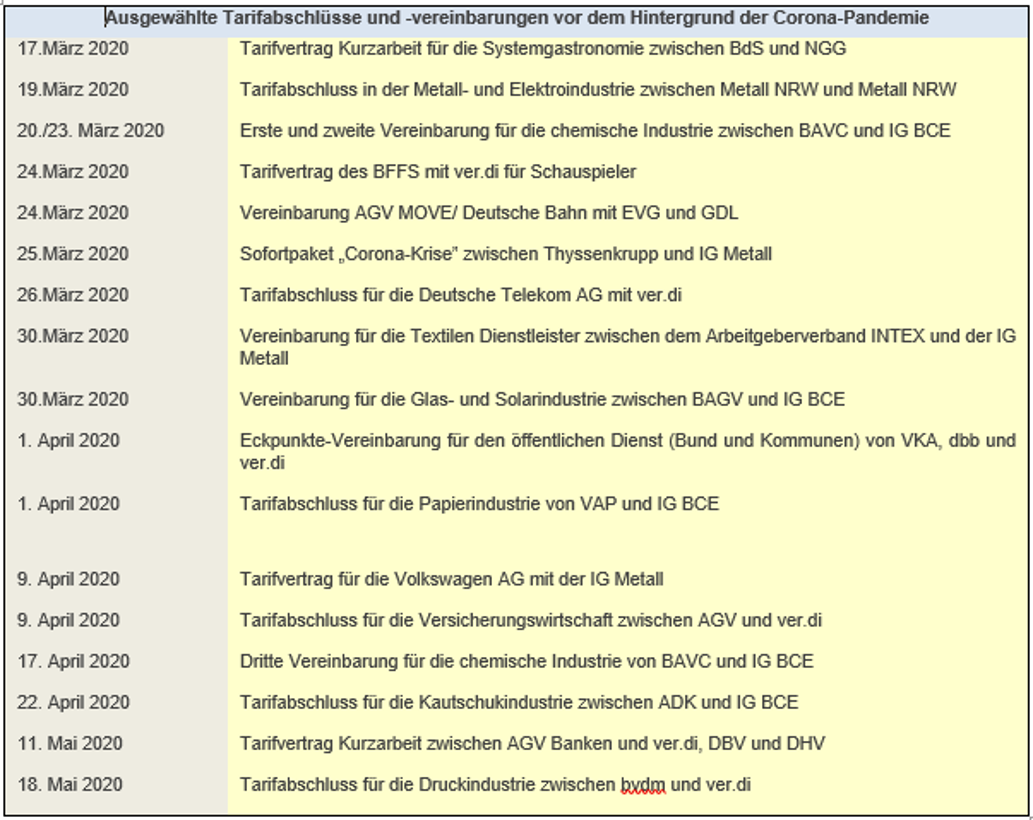Collective bargaining

©AdobeStock K.- P. Adler
It is a supporting pillar of the social market economy and a guarantor of social peace and prosperity in Germany. The BDA stands for the principle of collective bargaining autonomy and is committed to its modern development.
Consistently continue differentiation and flexibilisation of collective agreements
The economic framework conditions of an industry and the development of productivity are the right compass for a responsible collective wage policy. At the same time, wage differentiation and flexibility must be consistently pursued.
The responsible collective bargaining policy (link to text Collective bargaining policy) of the past ten years has proven that it is capable of shaping working conditions from the point of view of securing competitiveness and employment. Thanks to a productivity-oriented, differentiated and flexible collective bargaining policy, Germany has seen a steady increase in employment. During the financial and economic crisis ten years ago, employment was maintained at a high level at the time thanks to a clever collective bargaining policy, and it continued to grow significantly. How well the social partners in Germany are able to master crises with differentiated sectoral solutions can be seen again at present in the "Corona pandemic".
Productivity-oriented collective wage policy
In order to secure and strengthen the competitiveness of companies and employment, increases in collectively agreed wages must not exceed the scope of the economic possibilities of the individual sectors. The development of productivity in the economy as a whole is an important benchmark in this respect. However, it cannot be the central yardstick for wage policy in the individual sectors. Decisive for wage developments in the individual sectors are rather the concrete situation in the companies, the order situation, the employment situation and the economic expectations. These different components do not fit into a schematic wage formula. For this reason, general price increases cannot be used as a yardstick for wage increases. Inflation-led wage increases (link to text Wage development) either lead to further price rises and set in motion a "wage-price spiral" or undermine competitiveness and thus jeopardise jobs. Both are to the detriment of consumers, companies and employees.
Collective agreements with long terms, zero months and one-off payments
Collective agreements with long terms, which in recent years have often exceeded 20 months, offer companies the necessary planning security, especially in times of economic uncertainty. In addition, collective wage increases are often preceded by zero months. At the beginning of the term of the collective agreement there are often lump-sum one-off payments which are agreed in addition to or instead of a permanent increase in the collectively agreed rates. Such one-off payments do not affect the pay scale, i.e. they are not taken into account as an increase in the pay scale of the collective agreement. These are all components of collective bargaining policy that have become increasingly important for companies in recent years. Such components enable employees to participate in the company's success and at the same time make collective wage agreements more manageable for companies.
Differentiation and flexibility necessary
The regional collective agreement (link to text of collective agreement) must do justice to the different economic situations in the sectors. The collective bargaining policy of gearing all sectors to the first major collective agreement of a year is therefore rightly a thing of the past. Today, the sector-specific wage increases often form a wide range.
What is a "collective bargaining convoy"?
In the past, until the late 1990s, collective wage agreements in large sectors such as the metal and electrical industry or in the public sector had a much stronger signalling function for wage agreements in other sectors. The first far-reaching wage agreement of a year often acted like a "collective bargaining convoy". All subsequent negotiations "hung on" to this result and were strongly oriented towards it. Today it can be seen that the collective wage results differ greatly between the sectors. This is very welcome, as each industry knows best what challenges it faces and what it can afford in the long term.Companies obtain the necessary flexibility by agreeing on opening clauses in collective agreements. In most cases, depending on the economic situation of a company, these clauses give companies important scope for manoeuvre, e.g. in the area of pay, but also in the area of working time. Thus, opening clauses in the area of pay create the preconditions for being able, for example, to reduce or increase wage components such as one-off payments and special payments and to postpone or bring forward collectively agreed wage increases. Opening clauses in the area of working time enable companies to use working time corridors and thus to increase or reduce regular weekly working time if necessary. In recent years, the agreement of opening clauses has made an important contribution to improving the competitiveness of the German economy. Nevertheless, there are still sectors in which the trade unions do not allow urgently needed flexibility, particularly in the area of the volume of working time. There is still a need for action here. Challenges include the increasing digitalisation of the economy and society and its impact on the world of work, as well as demographic change with an increasingly ageing workforce in companies and a simultaneous shortage of skilled workers.








